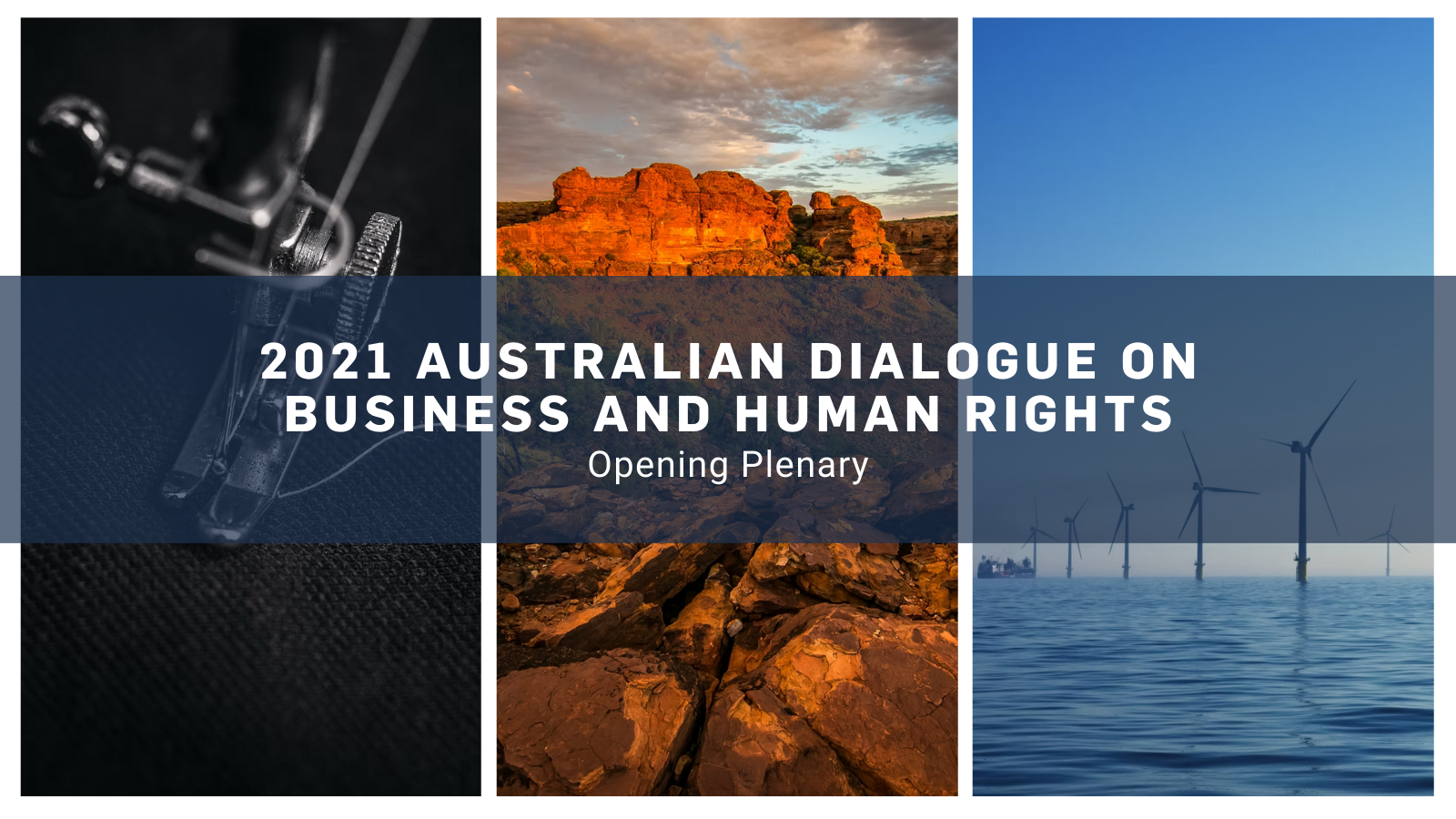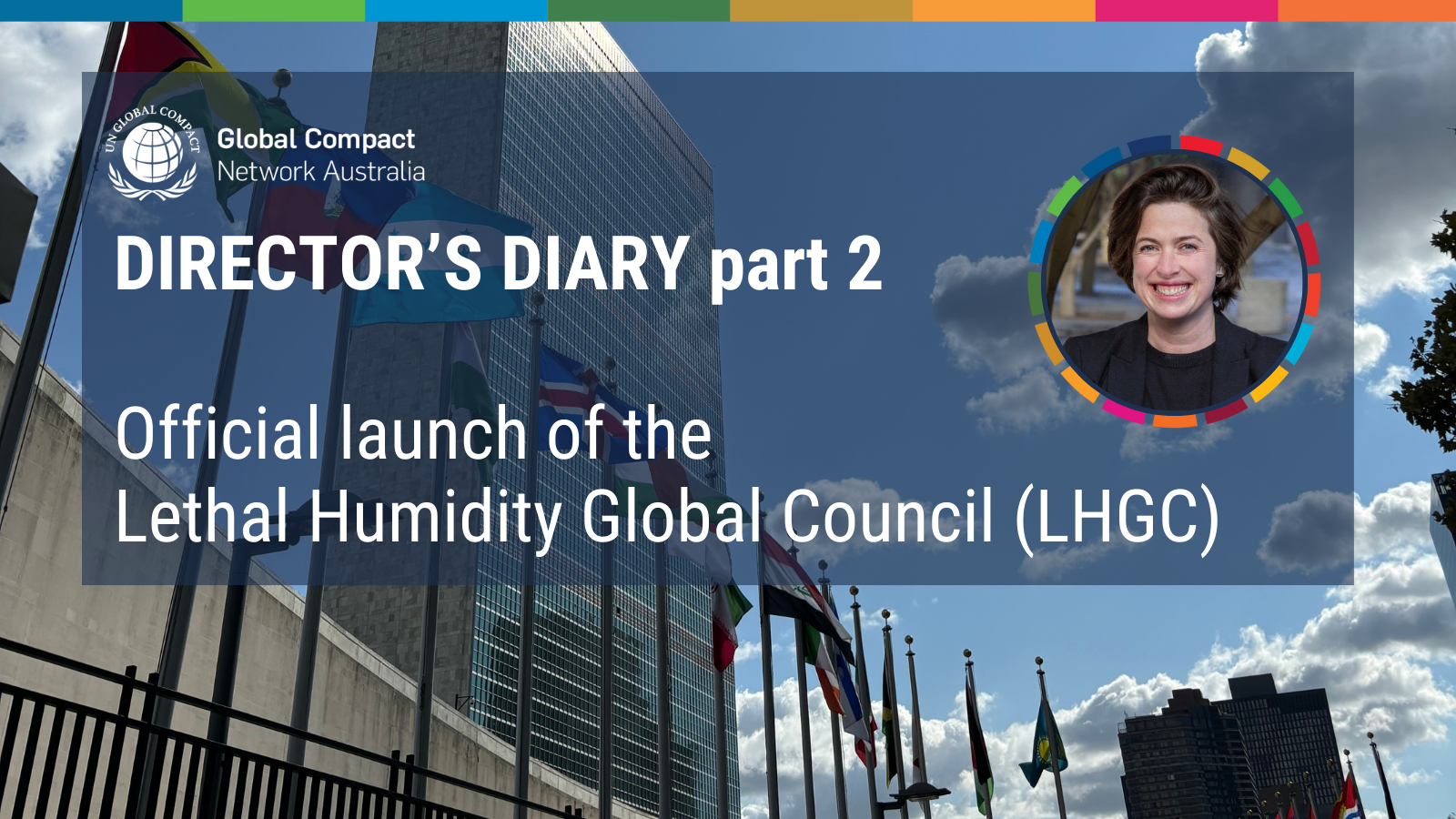
Blogs, Business & Human Rights, Featured, Media, News
BLOG | The 2021 Australian Dialogue on Business and Human Rights Opening Plenary
Corinne Schoch | November 22, 2021
Our eighth annual Australian Dialogue on Business and Human Rights opened on the 10th of November 2021.
The Opening Plenary titled ‘How the Pandemic is Reshaping Human Rights for Business’, explored the impact of the COVID-19 pandemic on business and human rights, and the challenges faced by business in continuing to implement the United Nations Guiding Principles on Business and Human Rights (UNGPs).
Following the Opening Plenary, a series of invitation-only Spotlight Series workshops prompted participants to consider the priorities, challenges, and opportunities for further collaboration between business, government, and the civil society sector. The three Spotlight Series workshops focused on the topics of modern slavery, indigenous rights, and decarbonisation.
As we mark the 10-year anniversary of the UNGPs in 2021, this year’s Dialogue presented an opportunity to take stock of the progress made over that first decade.
Here are our key reflections from the Opening Plenary.
Where are we now?
- Progress against the UNGPs over the past decade has been encouraging. Ten years ago, conversations about the human rights responsibilities of business were relatively fringe. Today, it has been normalised and increasingly mainstreamed. Thanks to the UNGPs, we now have a common language and framework to continue the work of embedding human rights norms within business management.
- In particular, the concept of due diligence – a key part of the UNGPs – has been increasingly taken up by both business and legislators. It is now incorporated in regulations in a growing list of countries, including France, the Netherlands, and the US.
- Investors and the ESG community are beginning to demonstrate a greater understanding of human rights risks and taking a leading role in advocating for human rights action with both policy makers and businesses. While this has tended to focus on risks to business, there is a steady trend toward also identifying risks to rightsholders.
- Globally, consumers continue to demonstrate concern for the working conditions and human rights of workers in global supply chains. The pandemic has had a marked impact on the number of employees paid a living wage and has been particularly detrimental to women.
There remain some significant gaps, however:
- While language on business and human rights is becoming normalised, this has not yet transformed into effective implementation, in many respects.
- Access to remedy remains a distant prospect for many rightsholders, particularly where impacts are the result of transnational activities.
- We have a confusing patchwork of mechanisms on access to remedy in many countries, including judicial and non-judicial mechanisms, but little information on the effectiveness of these systems.
- According to a report by Principles for Responsible Investment (PRI) last year, only 5% of their signatory companies recognise their responsibility to respect human rights.
- There is a lack of clear leadership and policy coherence from governments, including many that have not implemented National Actions Plans on business and human rights.
- At the international level, there is fragmentation between different agendas both under and relating to the UNGPs, including different regulatory approaches, the impact of climate change, and linkages with sustainable development.
- There is a significant gap on implementation within the public sector, both at national and international levels, for example in trade, commerce, finance and procurement.
- We also have a significant capacity gap and power asymmetry at the international level, between developing and developed countries, investors and recipients, communities and business. We do not have a level playing field.
- There is a lack of data, evidence, and monitoring of human rights impacts and responses. We need better data to let the evidence speak for itself, to support good decisions and sound policy, and to reinforce the legitimacy of effective solutions where they exist.
Looking ahead, where should our focus lie?
- Effective implementation, peer learning, data collection, knowledge management, empowerment, participation, and leadership.
- Understanding the vulnerably of those in the supply chain to economic changes, like those caused by the pandemic and climate change, must be central to the management of human rights issues.
- Considerable work is needed to guarantee access to effective remedies for victims of human rights harms.
- Countries should strive to develop clear and coherent policies, including National Action Plans, and establish a smart mix of mandatory and voluntary measures for human rights management.
- Identify and develop business models that contribute to sustainable development.
- Integrate work on climate risk with human rights management.
Watch the Opening Plenary
Speakers
Emcee: Professor James Cockayne, Professor of Global Politics and Anti-Slavery, University of Nottingham
Keynote address: Dante Pesce, Executive Director Vincular Center at Catholic University of Valparaíso-Chile, Former Chair of the UN Working Group on Business and Human Rights
Panel Discussion:
- Poonam Datar, CEO, Cleaning Accountability Framework
- Deborah Glass, Victorian Ombudsman
- Lyn Morgain, CEO, Oxfam Australia
- Simon O’Connor, CEO, Responsible Investment Association Australasia (RIAA)
- Facilitator: Vanessa Zimmerman, Director and Chair, Business and Human Rights, Global Compact Network Australia




